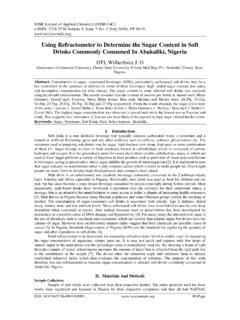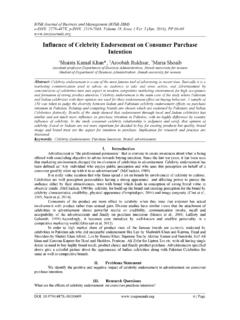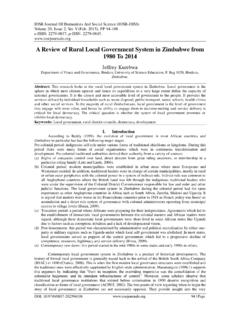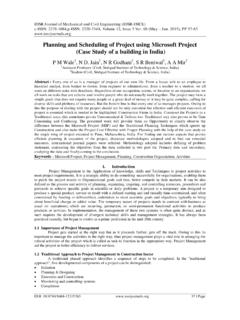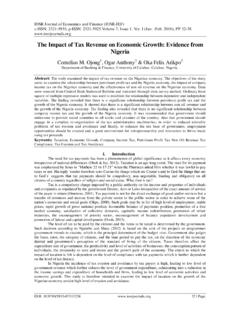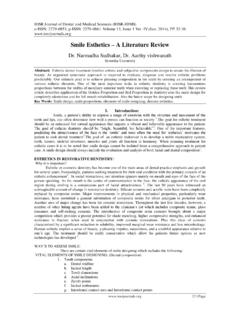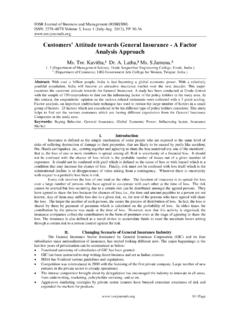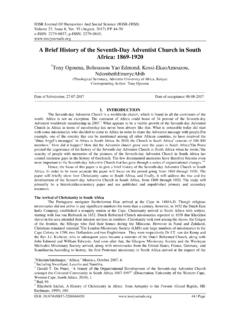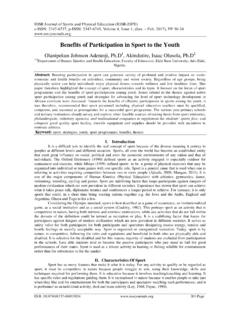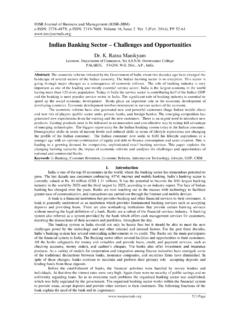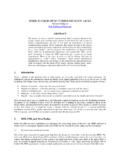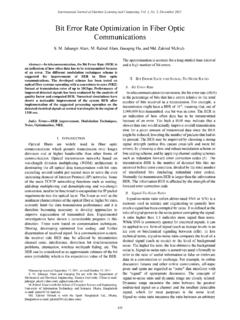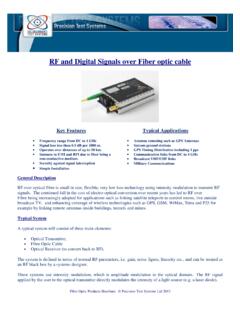Transcription of Communication Link Comparison between Optical …
1 IOSR Journal of Electronics and Communication Engineering (IOSR-JECE) e-ISSN: 2278-2834,p- ISSN: 10, Issue 5, Ver. I (Sep - Oct .2015), PP 45-47 DOI: 45 | Page Communication Link Comparison between Optical Fiber and VSAT for Offshore Platform Waleed Hassan Mohamed1, Babiker A/Nabi Mustafa2 Department of Communications, Faculty of Engineering, Al-Neelain University Khartoum, Sudan Department of Communications, Faculty of Engineering, Al-Neelain University Dean of Faculty Khartoum, Sudan Abstract: Communication links to offshore platforms can be implemented in many ways, using microwave, VSAT, or fiber. Each has advantages and disadvantages that depend on the paper shows wich one fiber or vsat link more suitable for offshore platform . keywords: vsat ,fiber,cost,distance and availability. I. Introduction Offshore platforms, whether for coastal defense systems, environmental monitoring, pipe line operations, or oil and gas production, represent a significant construction effort and investment.
2 Telecommunication links between an offshore platform and a shore facility are crucial and essential for platform operations and must be designed and selected carefully. Typically most offshore platforms are in a relatively fixed location for long periods, and telecommunication links may be planned and implemented in a conventional manner. Communication link operator in choosing and specifying depending on Cost: Both the one time equipment and commissioning cost must be considered, but more important is the recurring operating costs. The recurring operating cost will often exceed the one time capital costs. Capacity: Capacity is usually directly related to cost, both for recurring and one time capital costs. Reliability: Usually the operation of an entire production platform depends on a functioning communications link to a shore site. Therefore the link reliability is critical for maintaining the availability of the platform.
3 When considering communications link reliability be sure to separate the equipment reliability from the transmission reliability. This has a major effect on equipment design and selection. Back-up: Back-up equipment is considered essential by most operators due to the financial and safety penalty incurred if the equipment fails, and the cost and time to obtain spares and repair the problem. Physical Facilities: The physical facilities are different for each type of Communication link used and can be a factor in equipment selection. The usual factors are power, backup power, floor space, deck space, environmental conditioning, hazardous areas where equipment cannot be installed. User Services: User requirements for capacity (band width) increase year over year as more services become available for offshore use. Also to be considered are the types of services needed, and if they are IP enabled or a conventional TDM service.
4 The specific types and implementation of voice, video, and data, have a major effect on choosing a communications link due to performance considerations Remote Access: Remote access is important for monitoring and controlling the communications equipment on the offshore platform from a centralized network operations center (NOC). Offshore Networks: With the increasing number of multiplatform offshore developments, and the combination of multiple platform types used in a given development ( combining a central production platform with a floating storage and offloading platform), offshore networks between platforms are increasing in use, with one or more hub platforms providing the link to a shore site.[1 ] II. Optical Fiber Communication System The Optical Communication systems are different from microwave Communication systems in many aspects. In the case of Optical systems, the carrier frequency is about 100 THz and the bit rate is about 1T bit/s.
5 Further the spreading of Optical beams is always in the forward direction due to the short wavelengths. Even though it is not suitable for broadcasting applications, it may be suitable for free space communications above the earth s atmosphere like intersatellite communications. For the terrestrial applications, unguided Optical communications are not suitable because of the scattering within the atmosphere, atmospheric turbulence, fog and rain Communication Link Comparison between Optical Fiber And VSAT For Offshore Platform DOI: 46 | Page For longer range unguided Optical Communication systems the neodymium laser ( m) and the carbon dioxide laser ( m) were the most favorable sources. Using narrow bandgap compound semiconductors like indium sulphide (for neodymium laser) and cadmium mercury telluride (for CO2 laser ) one can have better detection using heterodyne detection techniques.
6 [5] But the fibers produced an enormous loss of 1000 dB/km. But in the atmosphere, there is a loss of few dB/km. Immediately Kao and his fellow workers realized that these high losses were a result of impurities in the fiber material. Using a pure silica fiber these losses were reduced to 20 dB/km in 1970 by Kapron, Keck and Maurer. At this attenuation loss, repeater spacing for Optical fiber links become comparable to those of copper cable systems. Thus the Optical fiber Communication system became an engineering reality.[6] III. VSAT Communication System VSAT systems provide high speed, broadband satellite communications for Internet or private network communications on a global basis. VSAT is ideal for mining camps, vessels at sea, satellite news gathering, emergency responders, oil & gas camps or any application that requires a broadband Internet connection at a remote location.
7 VSAT is an excellent way to connect your remote sites and workers with Internet communications for email, web access, video transmissions, Voice over IP telephone services, or other IP applications for your field operations. VSAT enables you to expedite your business processes by integrating field operations with your corporate wide area network.[3] IV. Communication Link Comparison between Fiber And VSAT Cost The two greatest challenges to high-speed Communication offshore were the significant upfront cost and the steep learning curve of high-tech maritime communications. However, a few of the leading communications service providers, such as Harris CapRock Communications, are now poised to offer fully configured solutions with long-term leases that spread the cost over many years and multiple customers, thereby offering fees comparable to traditional Very Small Aperture Terminal (VSAT) satellite systems with better performance.
8 Speed Connecting offshore platforms to land-based infrastructure via submarine fiber- optic cable links provides throughput 100 or even 1,000 times greater than traditional VSAT links at latencies of about 20-50 milliseconds. Comparatively, geosynchronous satellite transmission is more than 10 times slower because the microwave signal must travel to the satellite and back, more than 70,000 km (43,505 mi). Even at the speed of light, traveling this distance requires more than half of a second.[2] Signal Quality Other factors like signal processing speed, platform location and weather interference further slow down Communication . This in turn causes echoes, distortion, and otherwise degraded quality that interferes with satellite-based audio/video connections, and have historically prohibited the use of remote applications or any other software requiring real-time connectivity.
9 Fiber connections practically eliminate this latency and have proven to be safe and reliable in some of the harshest, most remote locations on Earth.[4] Due to limited RF power on the satellite down link channel, most VSAT links operate with a low carrier to noise ratio and have a very low margin for an acceptable error rate. Therefore any changes in the transmission path such as from rain or movement of the antenna can easily cause degraded performance. Distance Subsea fiber-optic systems can be especially desirable and efficient when even a small collection of platforms is clustered, and/or a platform is comparatively close to the shore. Once a fiber backbone is connected to one or more platforms, high-speed connectivity can be "hopped" from those connected platforms to surrounding assets using high-speed, high- reliability radio frequency (RF) links. Directional point-to-point transmitters propagate a focused RF signal to any receiver within line of sight range with lower latency and higher throughput than the VSAT it replaced.
10 RF can also be used to blanket a large area (up to 200 sq km [77 sq mi] or more) with high-speed connectivity. For big coverage no dout vsat network is the best option to reduce cost of expanding network through fiber lines. Communication Link Comparison between Optical Fiber And VSAT For Offshore Platform DOI: 47 | Page availability and reliability In the event of an emergency, high-reliability, high-speed connections facilitate the critical incident response that can be the difference between minor damage and a total loss. For instance, when a hurricane is threatening to destroy and sink an unmanned platform and traditional VSAT communications are compromised, the advantage of fiber's weather immunity and the ability to remotely command and control complex systems of sensors and bilge pumps cannot be overstated.
